 W
WAhtahkakoop (c. 1816 – 1896) was a Chief of the House Cree (Wāskahikaniwiyiniwak) division of the Plains Cree, who led his people through the transition from hunter and warrior to farmer, and from traditional indigenous spiritualism to Christianity during the last third of the 19th century.
 W
WFather Alexis André was a missionary Roman Catholic priest active in Western Canada.
 W
WBig Bear, also known as Mistahi-maskwa, was a powerful and popular Cree chief who played many pivotal roles in Canadian history. He was appointed to chief of his band at the age of 40 upon the death of his father, Black Powder, under his father's harmonious and inclusive rule which directly impacted his own leadership. Big Bear is most notable for his involvement in Treaty Six; he was one of the few chief leaders who objected to the signing of the treaty with the Canadian government. He felt that signing the treaty would ultimately have devastating effects on his nation as well as other Indigenous nations. This included losing the free nomadic lifestyle that his nation and others were accustomed to. Big Bear also took part in one of the last major battles between the Cree and the Blackfoot nations. He was one of the leaders to lead his people against the last, largest battle on the Canadian Plains.
 W
WCharles Arkoll Boulton is noted for his role in the Red River and North-West Rebellions.
 W
WWilliam Bleasdell Cameron was born July 26, 1862, in Trenton, Ontario. He is best known as being one of the survivors of the Frog Lake Massacre, and his book The War Trail of Big Bear that recounts his experiences of the massacre and his captivity.
 W
WSir Joseph-Philippe-René-Adolphe Caron, was a Canadian lawyer and politician. He is now best remembered as the Minister of Militia and Defence in the government of Sir John A. Macdonald and his role during the North-West Rebellion of 1885.
 W
WLawrence Clarke was the Chief Factor of the Saskatchewan District of the Hudson's Bay Company. He resided at Fort Carlton in Canada. He later became a magistrate. Clarke moved to what is today Prince Albert, Saskatchewan in the early 1880s and was a prominent local citizen with connections in the Conservative Party of Canada.
 W
WJames Cochrane was a Canadian construction contractor and politician, the Mayor of Montreal, Quebec between 1902 and 1904.
 W
WLeif Newry Fitzroy Crozier, commonly known as L.N.F. Crozier, was a Canadian militia officer and a superintendent of the North-West Mounted Police, now best remembered for his role in the North-West Rebellion of 1885, a resistance movement headed by Métis leader Louis Riel in what is now the modern province of Saskatchewan.
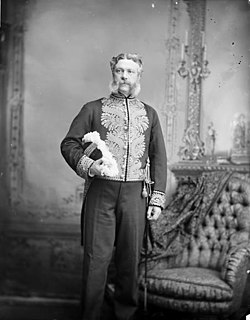 W
WEdgar Dewdney, was a Canadian surveyor, road builder, Indian commissioner and politician born in Devonshire, England. He emigrated to British Columbia in 1859 in order to act as surveyor for the Dewdney Trail that runs through the province. In 1870, Dewdney decided to take up a role in Canadian government. In this year, he was elected to the Legislative Council of British Columbia as a representative form the Kootenay region. In 1872, he was elected as a member of Federal Government for the Yale region representing the Conservative party. He was reelected to this position in 1874 and again in 1878. Dewdney served as Lieutenant Governor of the North-West Territories from 1879 to 1888, and the fifth Lieutenant-Governor of British Columbia from 1892 to 1897. Additionally, he served as the Indian commissioner in the North-West Territories from 1879 until 1888. In 1897, Dewdney retired from politics and began working as a financial agent until his death in 1916.
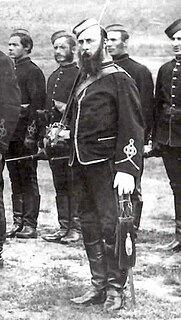 W
WFrancis Jeffrey Dickens was the third son and fifth child of Victorian English novelist Charles Dickens and his wife Catherine Dickens née Hogarth.
 W
WCampbell Mellis Douglas, was a Canadian recipient of the Victoria Cross, the highest and most prestigious award for gallantry in the face of the enemy that can be awarded to British and Commonwealth forces. The awarding of the VC to Douglas was one of the few instances of the VC being awarded for actions taken not in the face of the enemy.
 W
WGabriel Dumont (1837–1906) was a Canadian political figure best known for being a prominent leader of the Métis people. Dumont was well known for his movements within the North-West Rebellion at the battles of Batoche, Fish Creek, and Duck Lake as well as for his role in the signing of treaties with the Blackfoot tribe, the traditional main enemy of the Métis.
 W
WSir Eustace Edward Twisleton-Wykeham-Fiennes, 1st Baronet, known as Sir Eustace Fiennes, was a British soldier, Liberal politician and colonial administrator.
 W
WFine Day or Kamiokisihkwew (Miyo-Kîsikaw) was a Cree war chief of the River People band of Plains Cree. He participated in the North-West Rebellion of 1885. During the Battle of Cut Knife, he acted as the Battle Chief, taking control of the war fighting parties from the political chief, Poundmaker. When Fine Day's men gained the upper hand and started to pursue the retreating Canadian soldiers, he was restrained by Poundmaker from doing so.
 W
WArthur L. "Gat" Howard DSO, was an American and Canadian expert in the use of the early machine gun. He is best known for his use of a Gatling gun in support of the Canadian militia in the North-West Rebellion of 1885.
 W
WWilliam Henry Jackson, also known as Honoré Jackson or Jaxon, was secretary to Louis Riel during the North-West Rebellion in Canada in 1885. He was married to Aimée, a former teacher in Chicago.
 W
WAlbert Lacombe, commonly known in Alberta simply as Father Lacombe, was a French-Canadian Roman Catholic missionary who travelled among and evangelized the Cree and also visited the Blackfoot First Nations of northwestern Canada. He is now remembered for having brokered a peace between the Cree and Blackfoot, negotiating construction of the Canadian Pacific Railway through Blackfoot territory, and securing a promise from the Blackfoot leader Crowfoot to refrain from joining the North-West Rebellion of 1885.
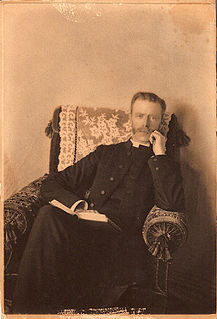 W
WGeorge Exton Lloyd was an Anglican bishop and theologian who helped found Lloydminster, a city on the border of the provinces of Alberta and Saskatchewan in Canada. Notorious for his racist views, he served as Bishop of Saskatchewan from 1922 to 1931.
 W
WJames Mason was a Canadian banker, Senator and military officer.
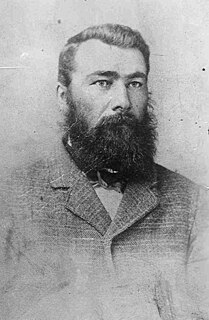 W
WThomas McKay was a Metis farmer and political figure in Saskatchewan, Canada. He represented Prince Albert in the Legislative Assembly of the Northwest Territories from 1891 to 1894 and from 1898 to 1905. McKay was the brother-in-law of Lawrence Clarke, and like Clarke was connected to the Conservative Party of Canada. McKay was a Protestant Métis or Anglo-Metis individual, and was involved in the troubles of 1885 on the side of the federal government. He was one of the first forty men to volunteer to help Major Crozier of the Northwest Mounted Police. He served as an envoy to negotiate with Metis at Duck Lake. He also operated as scout relaying messages between Major Crozier and Colonel Irving. His brother James McKay served with C Company of the Winnipeg Rifles during the 1885 Resistance.
 W
WAlbert Edward McPhillips was a Canadian politician and a barrister.
 W
WGeneral Sir Frederick Dobson Middleton was a British general noted for his service throughout the Empire and particularly in the North-West Rebellion.
 W
WGilbert John Elliot-Murray-Kynynmound, 4th Earl of Minto was a British aristocrat and politician who served as Governor General of Canada, the eighth since Canadian Confederation, and as Viceroy and Governor-General of India, the country's 17th.
 W
WStewart Mulvey was a Canadian teacher, newspaper editor, militia officer, office holder and politician.
 W
WCharles Nolin was a Métis farmer and political organizer noted for his role in the opposition of the North-West Resistance of 1885. He was educated by the bishop Provencher, then worked as a fur trader and a merchant.
 W
WGeneral Sir William Dillon Otter was a professional Canadian soldier who became the first Canadian-born Chief of the General Staff, the head of the Canadian Militia.
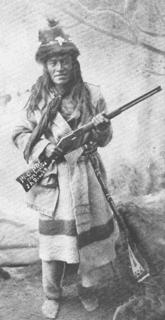 W
WPiapot, Payipwât, or Payipwat, born as Kisikawasan, known by his Assiniboine allies as Maȟpíya owáde hókši was a Native Canadian chief of the Cree-Assiniboine / Young Dogs Band, a mighty band and division of the Downstream People (Māmihkiyiniwak) of the Plains Cree. He was one of the five major leaders of the Plains Cree after 1860.
 W
WJeremiah “Jerry” Potts, , was an American - Canadian plainsman, buffalo hunter, horse trader, interpreter, and scout of Kainai (Blood) and Scots heritage.
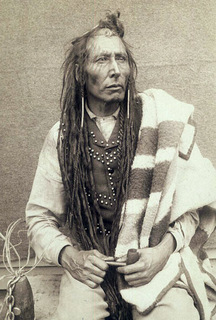 W
WPîhtokahanapiwiyin, also known as Poundmaker, was a Plains Cree chief known as a peacemaker and defender of his people, the Poundmaker Cree Nation. His name denotes his special craft at leading buffalo into buffalo pounds (enclosures) for harvest.
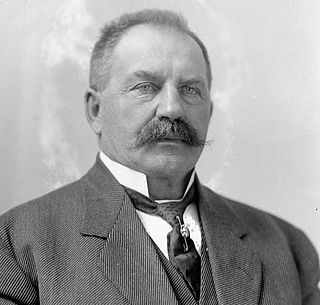 W
WJoseph Benjamin Prince was a farmer, rancher and political figure in Saskatchewan, Canada. He represented Battleford in the Legislative Assembly of the Northwest Territories from 1898 to 1905 as an Independent. Prince sat as a Liberal for Saskatchewan division in the Senate of Canada from 1909 to 1920 following his appointment by Sir Wilfrid Laurier.
 W
WHugh Richardson was a stipendiary magistrate for the Saskatchewan district of the North-West Territories. Richardson was the man who, at the conclusion of the 1885 trial of Louis Riel, sentenced Riel to hang.
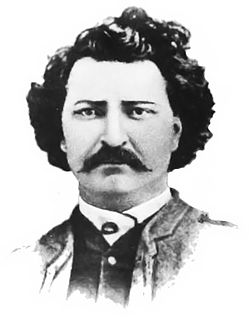 W
WLouis David Riel was a Canadian politician, a founder of the province of Manitoba, and a political leader of the Métis people of the Canadian Prairies. He led two rebellions against the government of Canada and its first post-Confederation prime minister, John A. Macdonald. Riel sought to preserve Métis rights and culture as their homelands in the Northwest came progressively under the Canadian sphere of influence. Over the decades, he has been made a folk hero by Francophones, Catholic nationalists, native rights activists, and the New Left student movement. Arguably, Riel has received more scholarly attention than any other figure in Canadian history.
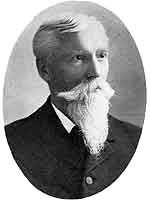 W
WThomas Scott was a Canadian military figure, Manitoba Member of the Legislative Assembly, Member of Parliament and the third Mayor of Winnipeg in the 19th century.
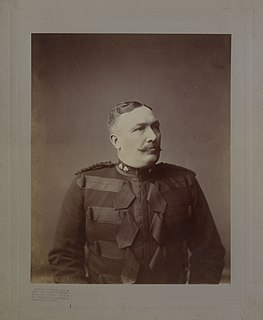 W
WMajor General Sir Samuel Benfield Steele was a distinguished Canadian soldier and police official. He was an officer of the North-West Mounted Police, most famously as head of the Yukon detachment during the Klondike Gold Rush, and commanding officer of Strathcona's Horse during the Boer War.
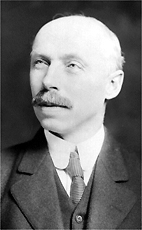 W
WJames Davis Taylor was a Canadian publisher, journalist, soldier and Conservative politician. As a member of the Ottawa Sharpshooters, Taylor was involved in resisting the 1885 North-West Rebellion. As a Lieutenant Colonel during World War I he commanded the 131st Battalion overseas.
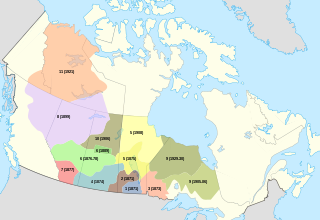 W
WWandering Spirit was a Cree war chief of a band of Plains Cree. There is little information on Wandering Spirit's life. Most of what is known begins shortly before the 1885 Frog Lake Massacre and ends with his execution at the hands of the Canadian government. However, there is some information regarding his role within the Plains Cree people.
 W
WFrederick George H. Williams was an English–Canadian journalist, writer, and historian.